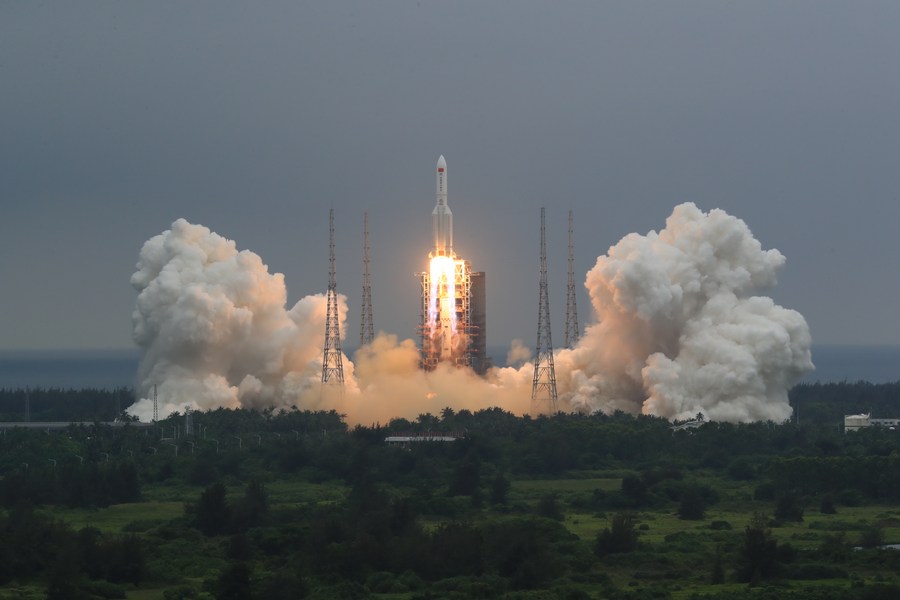China's Tianhe module shows a space program in lift-off
- By Tom Fowdy
 0 Comment(s)
0 Comment(s) Print
Print E-mail China.org.cn, May 5, 2021
E-mail China.org.cn, May 5, 2021

The first core module of China's space station, "Tianhe," or "Harmony of the Heavens," was launched from Hainan island last week. The module, which is expected to enter orbit roughly 400 km above the Earth's surface, commences a construction phase to be followed by 11 additional missions, and see it become operational by 2022. The station is positioned to carry out new large-scale experiments, provide in-orbit services for spacecraft and will accommodate up to six astronauts for short-term stays on its completion.
The initiation of China's own space station is a testament to how far the country's space program has come in a short period of time. Yet, the module launch is just one of several space-related projects China currently has underway. In just a few weeks, the Tianwen-1 mission will land on Mars, setting down the Zhurong rover, the first ever from Beijing to reach the red planet. Late last year, the Chang'e-5 mission brought back samples from the Moon, with Chang'e-6 planned for 2024 aiming to repeat the feat at the lunar south pole. This follows China and Russia having also signed a memorandum of understanding to build a scientific research station on the moon, which will be the first of its kind in history.
Space is the frontier of humanity's future – literally and metaphorically. For thousands of years, life has been locked down on the Earth and people have looked up to the stars with awe and mystery, wondering if it would ever be possible to reach beyond and understand the wider universe we are a part of. Despite the stellar achievements of the past century, in real terms mankind has only begun to make "baby steps" into outer space and to explore our surrounding "neighborhood." There's still much more to learn. Is there life out there? Are we alone in the universe? How big is it? Is the Earth unique among planets? The questions are endless, and the work is huge.
As a result, each progressive step of research and discovery concerning space is "world changing" in so many ways, and such scientific findings constitute some of the most prestigious elements of human success. It is therefore no surprise that countries stake so much on these results.
Long before the Space Age began, China was a leading nation and culture in the study of outer space. The cosmos plays a special role in its culture, one which places deep emphasis on the heavens, as well as the cycles of the sun and moon accordingly.
For thousands of years, China heralded many of the world's most advanced astronomers, discovering stars, constellations, patterns and creating sophisticated calendars of heavenly bodies which shaped the world. Today's achievements are a continuation of that grand scientific tradition, albeit with a modern edge. Its space program is a symbol of the country's modernity, of its transformation, and of its ambition to articulate leading technologies and discoveries for the benefit of all humanity that can revolutionize the way we live.
For China, outer space is "the common heritage of mankind," so ought to be utilized economically and scientifically for the benefit of all. The more we understand about space, the more we understand about our own planet. Subsequently, as we develop technologies aimed at solving the problems and challenges of space, this in turn contributes to innovation and development on Earth too. This is not a zero-sum game; China has contributed to the space programs of other countries too, such as by helping Ethiopia launch satellites into space. In the bigger picture, this is why its space program is on lift off. There is much to be excited about in the coming few years.
Tom Fowdy is a British political and international relations analyst and a graduate of Durham and Oxford universities. He writes on topics pertaining to China, the DPRK, Britain and the U.S. For more information please visit:
http://www.china.org.cn/opinion/TomFowdy.htm
Opinion articles reflect the views of their authors, not necessarily those of China.org.cn.
If you would like to contribute, please contact us at opinion@china.org.cn.






Go to Forum >>0 Comment(s)